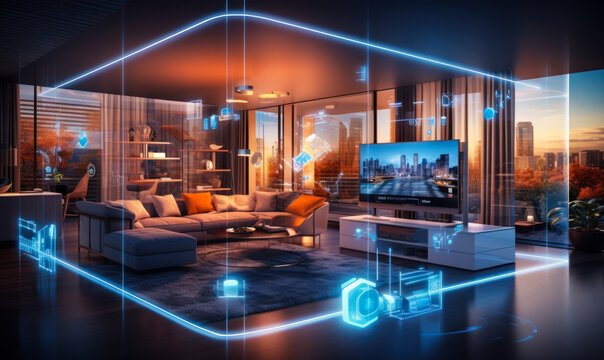Embracing the Future: How Home Automation Systems Transform Everyday Life

The concept of home automation systems has long transcended science fiction and has firmly established itself within the tapestry of modern living. Defined by the seamless integration of technology into domestic environments, these systems represent the pinnacle of convenience, security, and efficiency. As the world steadily marches towards an interconnected future, the relevance of home automation cannot be overstated. This article will delve into the profound impact of home automation on everyday life, heralding a new era of smart living.
Intuitive Living with Advanced Technology
Home automation systems are a conduit for intuitive living, allowing residents to manage their homes with unprecedented ease. Through smart devices and intuitive interfaces, actions such as controlling temperature, managing lighting, and operating security systems can be accomplished with minimal exertion. This leap in convenience has significantly enhanced the quality of life for individuals, providing them with the luxury of time and comfort.
Energy Efficiency and Cost Savings
One significant benefit of deploying home automation technology is the improvement in energy efficiency. Smart thermostats and lighting systems adeptly adjust to the habits and preferences of the household, minimising energy wastage. This not only reduces the carbon footprint of a home but also translates to considerable cost savings on utility bills.
Heightened Security and Peace of Mind
Security is a paramount concern for any homeowner, and home automation excels in providing robust solutions. With features like automated locks, surveillance cameras, and motion sensors, the systems deliver a comprehensive security network. The ability to remotely monitor and control these aspects directly contributes to a heightened sense of well-being among homeowners.
Improving Accessibility and Comfort
Another facet where home automation is transformative is in improving accessibility for those with mobility challenges or disabilities. Automated doors, voice-controlled appliances, and assistive prompts ensure that the home environment is supportive and adaptive to individual needs, reinforcing the idea of a caring and inclusive habitat.
The Impact on Daily Routines
Daily routines undergo a radical transformation with the implementation of home automation systems. Menial tasks such as adjusting blinds or setting alarms become obsolete, as these actions can be automated or scheduled. This refinement of everyday activities allows residents to focus on more meaningful pursuits, elevating their home experience to new dimensions.
Integration with the Internet of Things (IoT)
The advent of the Internet of Things (IoT) has accelerated the potential of home automation. IoT devices can communicate and collaborate, creating a network of interconnected gadgets that work in harmony to anticipate and cater to the needs of the household. This interconnectivity not only strengthens the functionality of each component but lays the groundwork for a home that truly embodies the concept of ‘smart’.
Customisation and Personalisation
The beauty of home automation systems lies in their ability to be tailored to the unique preferences of each homeowner. Whether it’s setting individual room temperatures or crafting personalised lighting atmospheres, these systems understand that each individual’s ideal home environment is distinct.
The Evolution of Smart Homes
As technology advances, the scope of what home automation can achieve continues to expand. Future homes might include advanced AI that learns and adapts to personal preferences, entire walls that serve as interactive displays, or even robots that handle household chores. The trajectory of smart homes is undoubtedly geared toward creating environments that are as responsive as they are revolutionary.
Staying Connected While Away
Home automation systems have obliterated the barriers of distance regarding home management. Homeowners can stay connected to their abodes from anywhere in the world, gaining the ability to perform actions such as feeding pets or watering plants remotely. This connectivity ensures that no matter where one is, the home is never truly left unattended.
The Challenge of Integration and Complexity
Despite the myriad advantages, the integration of comprehensive home automation systems is not without its challenges. Setting up a fully integrated smart home can be complex, requiring professional assistance and substantial investment. However, the benefits reaped from a well-implemented system far outweigh these initial hurdles.
Enhancing Lifestyle and Freedom
More than just a technological breakthrough, home automation systems are a lifestyle enhancement. They serve as liberators, freeing individuals from the tedious aspects of home management and empowering them with freedom and flexibility. This enriched lifestyle unshackles people, allowing them to devote more energy to pursuits that matter most to them.
The Road to Sustainable Living
Lastly, home automation stands at the vanguard of sustainable living. By maximising energy efficiency and reducing waste, smart homes play a pivotal role in promoting an environmentally conscious lifestyle. As global citizens become increasingly aware of the necessity for sustainable practices, home automation becomes not just a convenience but a moral imperative.
Conclusion
The transformation brought about by home automation systems is both profound and pervasive. As they continue to redefine everyday life, their impact ranges from the simplicity of task automation to the loftier goals of sustainability and inclusive living. The future unfolds with every smart home innovation, inviting us all to embrace the comforts and possibilities of a truly automated world.






